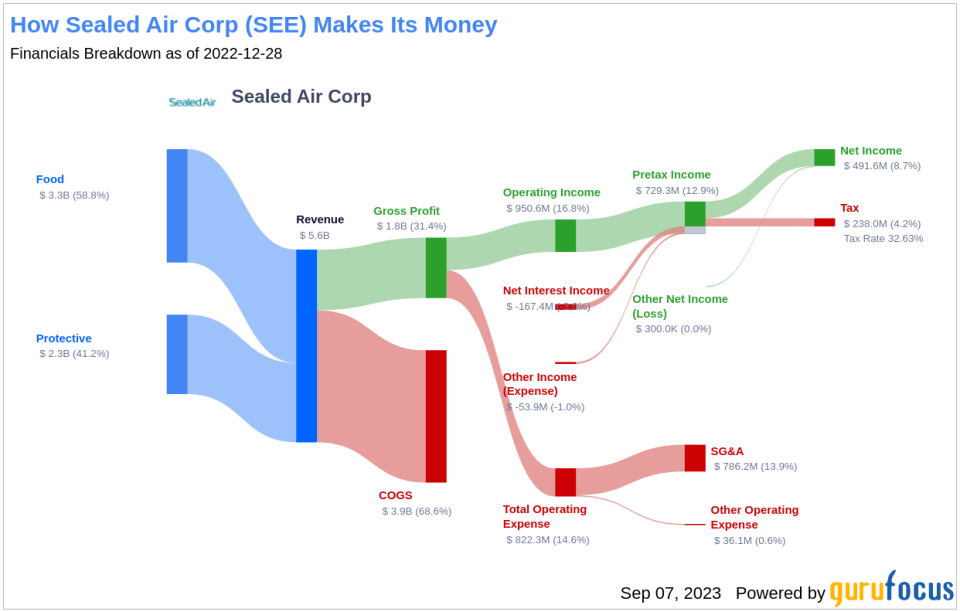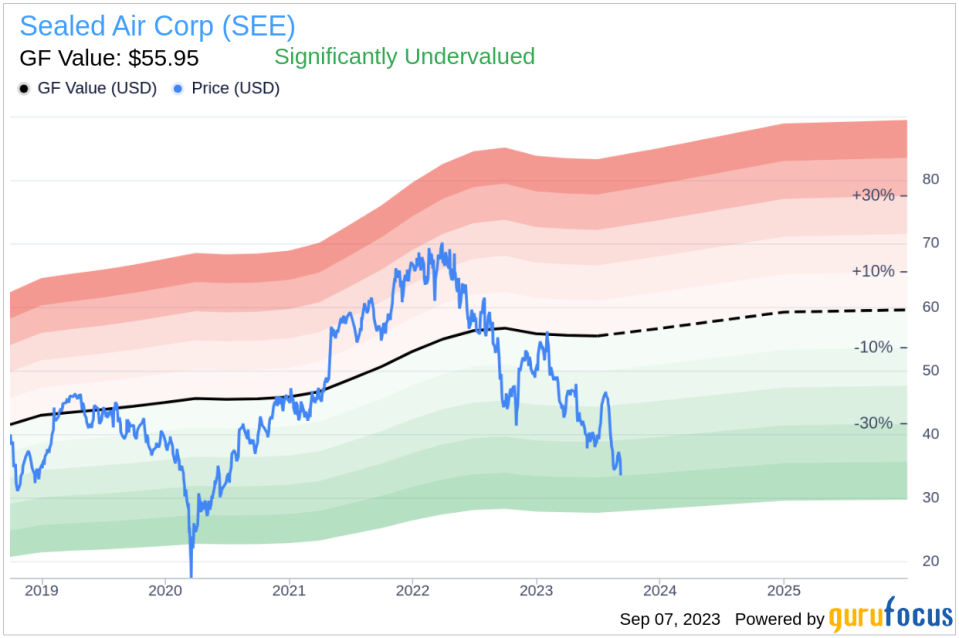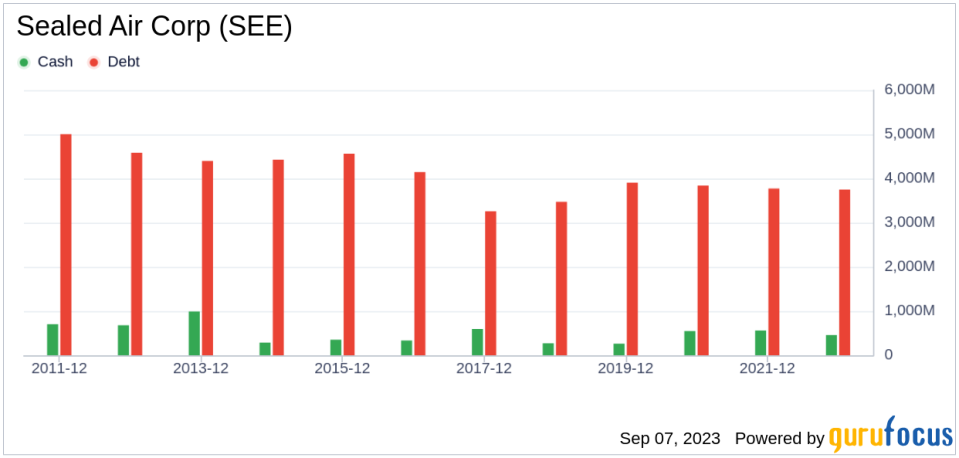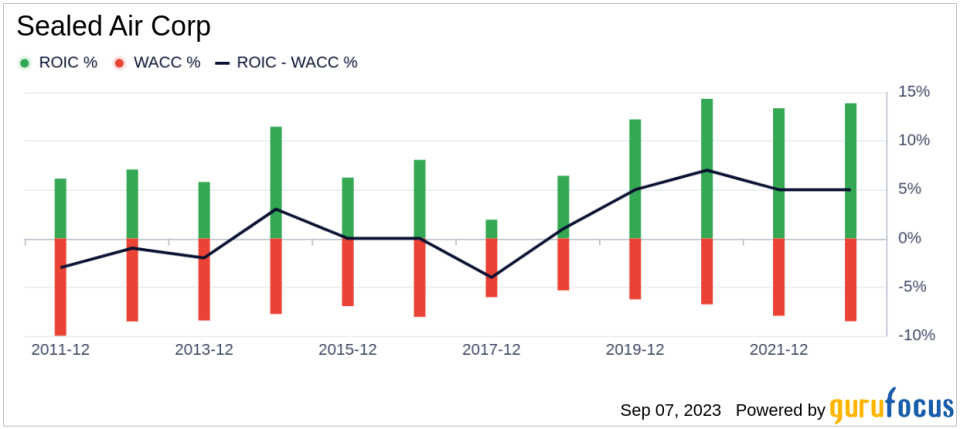Sealed Air (SEE)'s True Worth: A Complete Analysis of Its Market Value
Over the past day, Sealed Air Corp (NYSE:SEE) has experienced a loss of -5.24%, extending a three-month loss of -15.54%. Despite these numbers, the company's Earnings Per Share (EPS) stands at 2.68. This raises the question: Is Sealed Air significantly undervalued? This article will provide a comprehensive analysis of Sealed Air's valuation, encouraging readers to delve deeper into the financial intricacies of the company.
A Snapshot of Sealed Air Corp (NYSE:SEE)
Sealed Air Corp, operating through two reporting segments, provides food packaging products and industrial packaging systems. With products like Cryovac, Darfresh, and OptiDure primarily catering to meats, and Bubble Wrap, Instapak, Jiffy mailers, and shrink film packaging systems for industrial and e-commerce applications, Sealed Air has made a significant mark in the packaging industry. The company's current stock price is $33.61, with a market cap of $4.90 billion. However, the GF Value, an estimation of fair value, stands at $55.95, suggesting that the stock may be significantly undervalued.
Understanding the GF Value of Sealed Air
The GF Value is an exclusive method that represents the current intrinsic value of a stock. The GF Value Line on our summary page provides an overview of the fair value that the stock should ideally trade at. This is calculated based on historical multiples that the stock has traded at, a GuruFocus adjustment factor based on the company's past returns and growth, and future estimates of business performance.
Sealed Air's stock appears to be significantly undervalued based on the GF Value. If the stock's share price is significantly above the GF Value Line, the stock may be overvalued and have poor future returns. Conversely, if the stock's share price is significantly below the GF Value Line, the stock may be undervalued and have high future returns. Given Sealed Air's current price of $33.61 per share, the stock seems to be significantly undervalued, suggesting that the long-term return of its stock is likely to be much higher than its business growth.
Financial Strength of Sealed Air
Investing in companies with low financial strength could result in permanent capital loss. Therefore, it's essential to review a company's financial strength before deciding to buy shares. Sealed Air's cash-to-debt ratio of 0.06 ranks worse than 85.64% of 369 companies in the Packaging & Containers industry. Based on this, GuruFocus ranks Sealed Air's financial strength as 4 out of 10, suggesting a poor balance sheet.
Profitability and Growth of Sealed Air
Investing in profitable companies carries less risk, especially in companies that have demonstrated consistent profitability over the long term. Sealed Air has been profitable 10 years over the past 10 years. During the past 12 months, the company had revenues of $5.50 billion and Earnings Per Share (EPS) of $2.68. Its operating margin of 15.23% is better than 91.23% of 365 companies in the Packaging & Containers industry. Overall, GuruFocus ranks Sealed Air's profitability as strong.
Growth is probably the most important factor in the valuation of a company. The 3-year average annual revenue growth rate of Sealed Air is 7.4%, which ranks better than 52.68% of 355 companies in the Packaging & Containers industry. The 3-year average EBITDA growth rate is 17.4%, which ranks better than 73.37% of 338 companies in the Packaging & Containers industry.
ROIC vs WACC
Another method of determining the profitability of a company is to compare its return on invested capital to the weighted average cost of capital. Return on invested capital (ROIC) measures how well a company generates cash flow relative to the capital it has invested in its business. The weighted average cost of capital (WACC) is the rate that a company is expected to pay on average to all its security holders to finance its assets. When the ROIC is higher than the WACC, it implies the company is creating value for shareholders. For the past 12 months, Sealed Air's return on invested capital is 10.03, and its cost of capital is 7.93.
Conclusion
Overall, Sealed Air's stock appears to be significantly undervalued. Despite its poor financial condition, the company's profitability is strong, and its growth ranks better than 73.37% of 338 companies in the Packaging & Containers industry. To learn more about Sealed Air stock, you can check out its 30-Year Financials here.
To find out the high-quality companies that may deliver above-average returns, please check out GuruFocus High Quality Low Capex Screener.
This article first appeared on GuruFocus.




